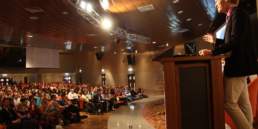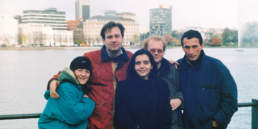The first edition was a great success: in May 2014 altogether 16 AEGEE members visited Tunisia in the framework of the EuroArab project. One week long they explored country and culture, people and society. In two months, from 11th to 16th, there will be a new opportunity for all AEGEE members to get know the region like no tourist can. “We are trying to create the Tunisia we dream of”, says Mariem Ben Ltaifa, main organiser of the Tunisia trip in 2014, who will also coordinate this year’s edition. The event is organised in cooperation with the Europe in Exchange project of AEGEE-Europe. The Golden Times spoke with Mariem and also with Jorge Miguel, Project Manager of Europe in Exchange. Don’t miss the opportunity to apply – the deadline is 22nd of March.
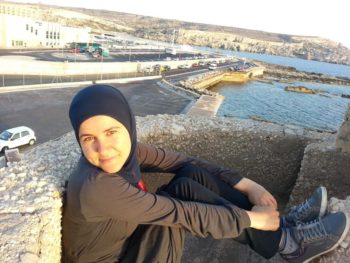
GT: What is the purpose and programme of the six-day visit to Tunisia?
Mariem Ben Ltaifa: The purpose of the event is to bring youth from different cultures and backgrounds together to discuss – and to deny stereotypes and prejudices that the media may cause nowadays because of the geopolitical situation in the region. Together we will create new projects and increase the youth mobility between the two shores of the Mediterranean. Of course we will also discover the Tunisian flavor – from the revolution to culture and traditions.
GT: How many AEGEE members can participate?
Mariem: Around 15 to 20 participants.
GT: The participants will get the chance to develop projects with partners from Arab countries. What kind of projects can that be?
Jorge Miguel: One of the main aims of this event is that, as follow-up, there will be new partnerships established between the organizations involved, leading to new youth projects, like youth exchanges, European Voluntary Service activities, seminars or training courses. The thematic of those projects would be completely up to the participants, antennae and organizations involved, therefore it is difficult to say something now, before knowing exactly who will participate in the event.
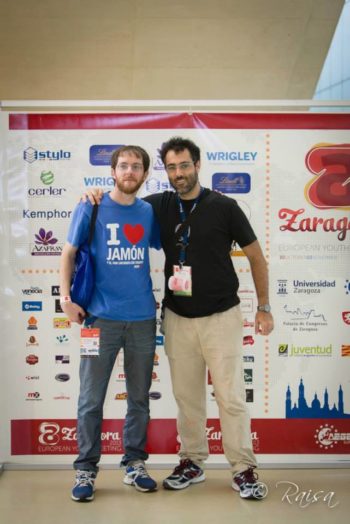
GT: Last year the participants had the chance to discuss with a lot of local citizens in round tables and during meetings with other NGOs. What impressed or surprised them most?
Mariem: The discussions were mostly about the revolution, since most of the participants were interested in this topic. The difference between the situation before and after the revolution was the most impressive I think. The diversity of opinions and the satisfaction level of local people with the outcomes of the revolution surprised them most.
GT: Main local organiser of the Club Culturel Ali Belhouane-Tunis in partnership with the Europe in Exchange project of AEGEE. What’s the role of AEGEE in this youth exchange?
Jorge: An important part of the participants – probably more a half of them – are expected to be AEGEE members. Europe in Exchange is involved in helping in the preparation of the content of the event and distributing the call for participants in AEGEE. By being involved in this project, AEGEE will continue the work of establishing bonds between European and Arab countries which started with the EuroArab project.
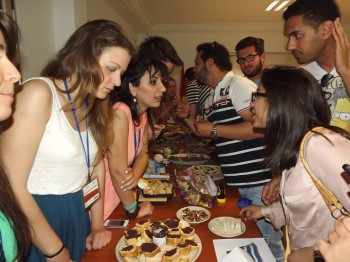
GT: Tunisia was the starting point of the Arab spring. How does the country present itself? Is it on a good way to a more democratic and open society?
Mariem: I think we are on the right way. We recently had votes on many new rules in the constitution that insures the civil rights of Tunisians in different categories. I think we are trying to create the Tunisia we dream of, with slow but sure steps. I believe that this is noticed by seeing that the Tunisian revolution was the most successful one in the Arab area.
GT: Why do you think AEGEE members should participate in this event? What do you think will be its impact on them?
Jorge: This is a great opportunity to discover a new country and culture outside of the European context. Tunisia is close to many European countries but, despite of it, many of us know very little about it. Europeans should look more at their neighbours and increase the relationship with them, to get to know better each other and to establish more collaborations. The event will allow the participants to discover the work of different youth organizations and NGOs in Arab countries, understand better their reality and take lessons to improve the management of their antennae. At the same time, the Tunisian and other Arab organizations which will be involved in the project will gain from the experience and can learn from our activities and way of working. The participants will surely incrase their knowledge about Tunisia and about women and democracy issues in Arab countries, become more open-minded and will be more prepared to collaborate with people and organizations from Arab countries in the future.
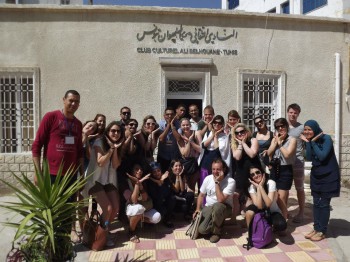
GT: Last year you mentioned that a lot of stereotypes were broken last year. Can you give examples?
Mariem: I would say that it was definitely the situation of women in Tunisia. Our European participants saw that most of the responsibles that we met were females. We had a presentation about women empowerment and gender equality efforts in the country, which has changed the prejudices that participants may have had for different reasons.
GT: The EuroArab Night was one of the highlights last year. What can you tell us about it? And will it be part of the programme this year too?
Mariem: Of course! We think that it’s an important element, because it’s the best occasions for youth from both sides to present their cultures in an informal and funny way with music, traditional dances, costumes and food.
More info:
The participation fee of 140 euros includes
– Accommodation in a hostel
– 3 meals per day
– Transportation while in Tunisia
– Entrance costs to all the places you visit
Send your application to mbenltaifa@sfcg.org. In your application include:
– Name
– Antenna
– Country
– Date of birth
And please answer the following questions:
1. What first comes to your mind when you think about Tunisia? Have you ever been to an Arab country? What was your experience?
2. What do you hope to achieve by coming to this event?
3. Why should the organisers choose you in particular?
Related Posts
1st August 2019
The Gallery of All Presidents of AEGEE-Europe
Here is the gallery of all Presidents of AEGEE-Europe - with photos of every one of them. Enjoy the list!

